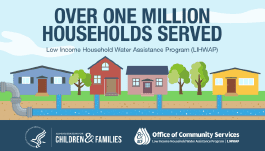AWWA continues push for permanent water assistance program
December 14, 2023

AWWA Articles
AWWA continues push for permanent water assistance program
 For many disadvantaged and vulnerable communities, the cost of basic water service continues to pose a challenge. In response, the American Water Works Association (AWWA) is continuing its focus on water affordability and urging the federal government to create and fund a permanent low-income assistance program for the water and wastewater sectors.
For many disadvantaged and vulnerable communities, the cost of basic water service continues to pose a challenge. In response, the American Water Works Association (AWWA) is continuing its focus on water affordability and urging the federal government to create and fund a permanent low-income assistance program for the water and wastewater sectors.
In its latest Drinking Water Infrastructure Needs Survey and Assessment, the U.S. Environmental Protection Agency (EPA) estimated that drinking water systems will need to invest $625 billion to repair, replace and maintain drinking water infrastructure over the next 20 years. Systems will also require substantial new investment to meet evolving regulatory requirements and address emerging threats like climate change. (Image courtesy of EPA.)
 While the Infrastructure Investment and Jobs Act provides more than $50 billion to help meet these challenges, there is a significant gap between federal investment and the level of funding required. This significantly challenges water systems as they work to deliver essential and affordable water services to their customers and communities.
While the Infrastructure Investment and Jobs Act provides more than $50 billion to help meet these challenges, there is a significant gap between federal investment and the level of funding required. This significantly challenges water systems as they work to deliver essential and affordable water services to their customers and communities.
“AWWA’s focus over the next several months will be securing support for a permanent Low-Income Household Water Affordability Program (LIHWAP) in President Biden’s FY25 budget proposal, as well as passage of legislation to authorize an improved, permanent low-income water customer assistance program into the future,” said Nate Norris, AWWA’s legislative affairs senior manager.
“LIHWAP was created in response to the pandemic, but our message to Congress has been that water affordability challenges existed before the pandemic and continue to exist today,” he added.
Building support for ongoing water assistance
Last April, AWWA partnered with the Association of Metropolitan Water Agencies (AMWA), the National Association of Clean Water Agencies (NACWA), the Water Environment Federation (WEF) and the National Association of Water Companies (NAWC) to release a joint report recommending that Congress build on the success of the Low-Income Household Water Affordability Program (LIHWAP) by incorporating an improved, permanent program into the federal safety net alongside energy and nutrition assistance.
Congress first authorized LIHWAP as part of the American Rescue Plan Act and funded the program under the Consolidated Appropriations Act of 2021. The program, housed at the Department of Health and Human Services, was a temporary measure enacted during the Covid pandemic to prevent shutoffs and help people stay current on their water and wastewater bills. In total, more than 13,000 water and wastewater systems have participated in LIHWAP nationwide, helping more than 1.1 million households nationwide maintain or restore water service.
 With funding for LIHWAP ending this year, the push for a permanent program is a major priority for AWWA and its water sector partners. Without additional funding for the program or legislation to create a permanent program, hundreds of thousands of low-income households could once again fall behind on their water payments.
With funding for LIHWAP ending this year, the push for a permanent program is a major priority for AWWA and its water sector partners. Without additional funding for the program or legislation to create a permanent program, hundreds of thousands of low-income households could once again fall behind on their water payments.
“For two years, LIHWAP has been a lifeline for customers struggling to keep up with their water bills,” said Tracy Mehan, AWWA’s executive director of Government Affairs. “Despite the expiration of the program, the affordability challenges remain. Congress should recognize the importance of water to health and safety and authorize a permanent program to help people maintain affordable access, just as they do for other basic needs such as energy, food, and housing.”
This October, AWWA also signed on to a joint letter with more than 150 water associations, environmental organizations, low-income and other public interest advocates, and labor unions urging Congress to prevent a funding lapse for LIHWAP by providing bridge funds for the program in FY24. The letter emphasized that water assistance is equally as important as existing federal programs such as Low-Income Home Energy Assistance Program (LIHEAP), Supplemental Nutrition Assistance Program (SNAP), and the Housing Choice Voucher Program.
To build upon the joint letter to Congress, AWWA’s Government Affairs team will focus their efforts over the next year on laying the groundwork for a permanent program in Fiscal Year 2025.
AWWA provides more information about water affordability on its affordability resource page. Legislative activity related to a permanent low-income assistance program can be found on the policy & advocacy page.
Advertisement